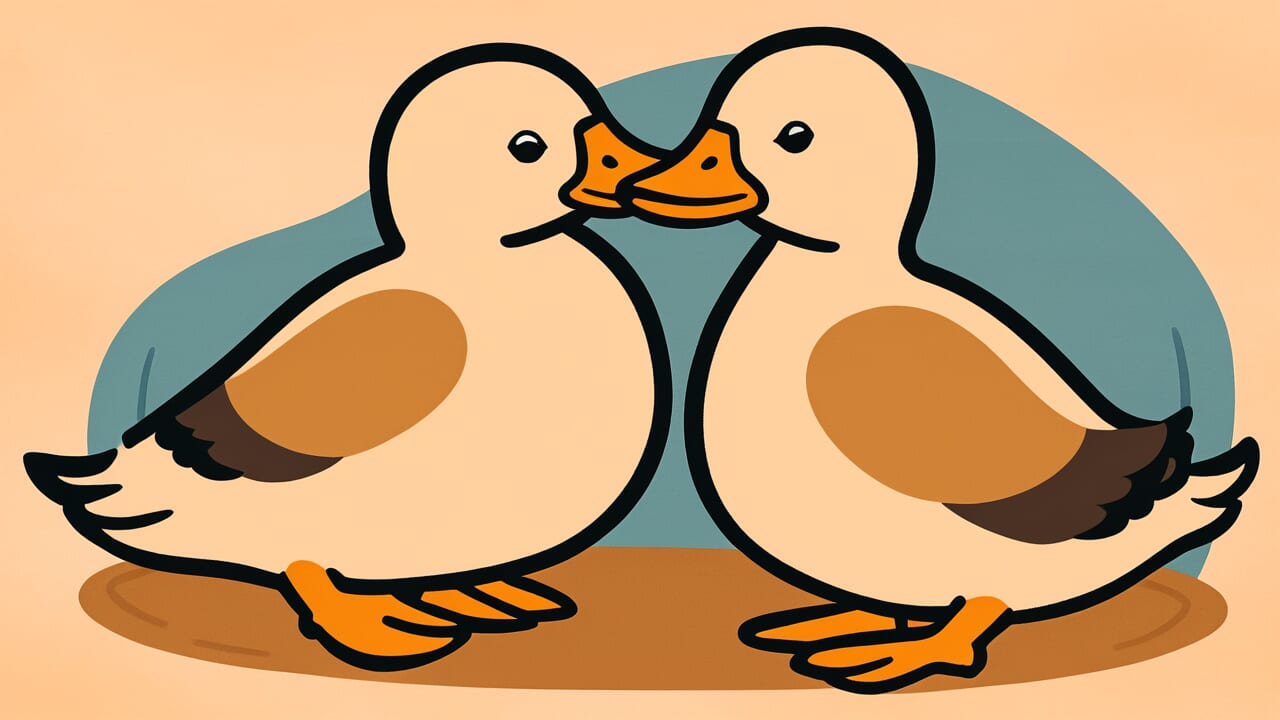How to Read “Cousins are the taste of duck”
Itoko dōshi wa kamo no aji
Meaning of “Cousins are the taste of duck”
This proverb expresses the unique difficulty of cousin relationships. Cousins share blood ties, which makes them easy to get along with.
They often see each other at family gatherings and events. However, this very closeness can lead to problems.
People sometimes act rudely or speak without thinking around their cousins. They might hurt each other with careless words.
Cousins aren’t bound by the deep connection that siblings share. This means small conflicts can create surprisingly large rifts between them.
People use this proverb when cousins fight at family gatherings. It also explains troubles that arise from relationships that are too close.
The expression captures the essence of human relationships. It describes the difficulty of dealing with people who are “neither too close nor too distant.”
Today, this lesson applies to many relationships beyond cousins. It includes close friends and coworkers where maintaining proper distance matters.
Origin and Etymology
No clear written records explain the origin of this proverb. However, we can make interesting observations from how the phrase is structured.
Understanding what “the taste of duck” means is the key. Duck has been eaten in Japan since ancient times.
Duck meat has a distinctive flavor. While delicious, it’s also tricky to prepare properly.
If you cook it wrong, duck can become smelly or tough. The meat has both good qualities and difficult aspects.
Cousin relationships are just like the taste of duck. Blood ties make cousins easy to be around.
They’re not as close as siblings, which makes the relationship more relaxed. But this closeness also creates problems.
People forget their manners because they’re too familiar. The bond isn’t as strong as family, so small things can make the relationship awkward.
This expression probably emerged among common people during the Edo period. People back then had a talent for using familiar foods as metaphors for human relationships.
They compared the subtle distance of cousin relationships to delicious yet difficult duck. This proverb reflects the wisdom of everyday life.
Usage Examples
- People say “Cousins are the taste of duck,” and it’s true – when I met my cousin after a long time, he brought up an old fight and things got awkward
- Family relationships are like “Cousins are the taste of duck” – because we’re so close, we actually have to be more careful with each other
Universal Wisdom
This proverb teaches us a universal truth about the subtlety of “distance” in human relationships. The closer we become to someone, the less reserved we act around them.
This is natural and, in some ways, proof of trust. However, this lack of restraint can also hurt others or damage relationships.
Cousin relationships embody this contradiction perfectly. The bond isn’t as deep as family, but they’re not as distant as strangers either.
This makes the boundaries unclear. How far can you go? How much can you speak your mind? These lines become blurry.
Humans are social creatures who live within various relationship distances. Parents and children, siblings, friends, coworkers, and cousins.
Each relationship has its appropriate distance. If too close or too distant, the relationship doesn’t work well.
Our ancestors expressed this delicate balance through the perfect metaphor of duck’s taste. They captured the difficulty beautifully.
This proverb has been passed down through generations. Every era has struggled with “the difficulty of relationships that are too close.”
How do we balance familiarity with courtesy? This is an eternal theme that humans face as long as we live in society.
When AI Hears This
Humans sometimes feel that cousins, who share only 12.5 percent of their genes, make “better relationships” than siblings, who share 50 percent.
From an evolutionary biology perspective, this makes surprising sense.
Helping blood relatives is evolutionarily advantageous. It means preserving copies of your own genes.
However, cooperation with very close relatives has a major pitfall: inbreeding depression.
When genetically similar individuals produce offspring, harmful genes become more likely to appear. This increases the risk of diseases and disabilities.
Research shows that children of siblings have about 40 percent increased genetic problems. Children of cousins only show about 2 percent increase.
The cousin distance represents a perfect balance point. It offers genetic benefits from helping relatives while avoiding the genetic risks of being too close.
Optimal outbreeding theory shows that many species prefer cooperation partners at the cousin to second-cousin level of relatedness.
This proverb expressed cousin relationships through the deliciousness of “duck’s taste.” This might be evidence that humans unconsciously sensed this biological optimal solution through long evolutionary history.
We’re programmed to instinctively feel comfortable with relationships that are neither too close nor too distant.
Lessons for Today
This proverb teaches modern people that we must never forget “courtesy and consideration,” even in close relationships.
This lesson becomes more important in today’s era when SNS makes connections so easy.
Close friends, long-time coworkers, comfortable companions. In such relationships, don’t we sometimes use rough language or dismiss others’ feelings?
The carelessness of thinking “it’s okay to say this much” can crack important relationships.
In practical terms, we should carefully express “thank you” and “I’m sorry” to those closest to us.
Even with family and best friends, properly voice your gratitude and apologies. This seems obvious, but surprisingly many people fail at this.
Closeness and courtesy don’t contradict each other. Rather, truly important relationships require maintaining respect for the other person.
Because the relationship is so close, step back and consider the other person. This mental space will make your relationships richer and longer-lasting.



Comments